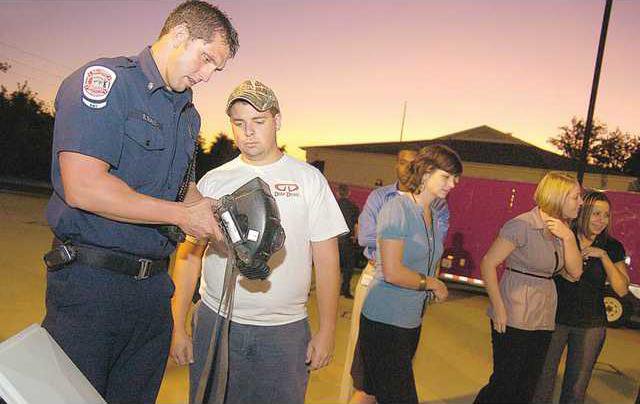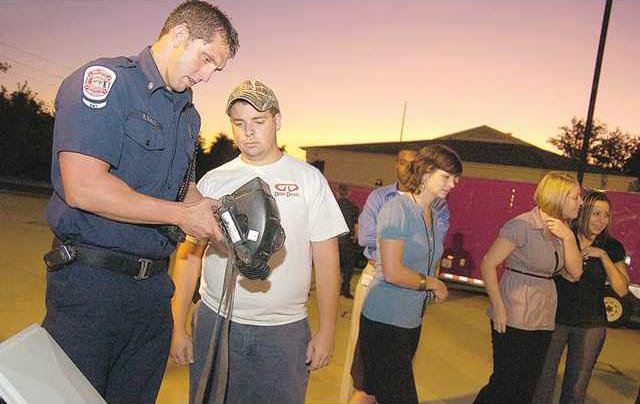Hall County’s Citizens Fire Academy is really all about the chance to dress like a hero and fight a real fire.
Inevitably, though, 10 weeks of indulging your inner 5-year-old does more for your grown-up, taxpaying sensibilities than the sheer thrill of wearing a red helmet.
Despite my journalistic duty to remain a realist, I signed up expecting my experience to culminate with a scene not unlike one out of "Backdraft" — one that might involve standing aggressively flat-footed, holding a hose at my hip and beating down the blaze like a fire-fighting mafioso.
But on graduation day — the day we got to put on the gear and put out a fire —I had about one minute on the front end of the hose and there was no standing, only a humiliatingly laborious 12-foot crawl.
Aside from the cost of my outfit — nearly $6,400 — it was not quite action movie material.
Even if it had been, it may have been little compared to the expanse of what Hall County Fire Services had become to me in the nine previous weeks. It was much more than fighting fire.
As members of the academy, my classmates and I spent Tuesday evenings learning that the $14 million county department requires much more than a truck and some hoses and helmets to be ready for an emergency.Although there may not be a catastrophe every day, the department is expected to respond to whatever may happen in Hall County at any moment.
Much of it requires money and training. In a county situated on a lake and laden with industry, being a Hall County firefighter requires a varied set of skills. They must be experts on hazardous materials — knowing which businesses keep what chemicals and how to contain them if they spill — and adept at deep-water diving.
Each week, a lieutenant, chief or captain of some division of the department I had never heard of would come to class and explain to my classmates and I that the jobs of the firefighters extend further than extinguishing burning buildings and responding to car accidents.
They taught us that their ability to meet whatever need arises depends on both funding and training. But training, too, depends on funding.
The Marine Rescue team, obviously, requires a boat. But the department’s boat only is equipped for rescue. If a fire happens on the lake, Hall County Fire Services must fight it from the land until funding comes available for a "pumper boat" equipped to fight fire.
The Marine Rescue team and other special teams in the department — Ropes Rescue and Haz Mat — that do not see specialized action every day must spend hours training to keep their skills up to par.
Since Sept. 11, 2001, emergency management has moved to the forefront of security concerns and further up on the funding list, said William Wright, the deputy director of Hall County Emergency Management.
Wright is the only full-time staffer of emergency management. His office sits behind what would be the emergency operations center, a place in which representatives from utility companies to a multitude of government agencies would coordinate resources for any catastrophe.
He has yet to use the command center, but Wright, who said emergency management was once a "paper shuffle," has to be ready for anything: hazardous weather, an ammonia leak or a terrorist’s attack.
Citizens Fire Academy is designed to give county residents a chance to see where a goodly portion of their tax dollars go and understand how the county’s fire department and emergency medical service are organized and operated.
The facets of the Hall County Fire Services department — from emergency medical services to dispatch to communications and special operations — are many and diverse, as are the skills and equipment required for each. It takes 10 weeks to give Citizens Fire Academy just a brief overview of all of them.
The fire my classmates and I were called upon to put out on graduation day was not a conflagration, but a bonfire bound to a corner of a downstairs room not nearly as formidable as the brick floor across which we were forced to drag our uncushioned knees.
In retrospect, I am glad it didn’t turn out as I had initially imagined. As a rookie, I found a 12-foot crawl on my knees to extinguish a stack of burning wooden platforms was adventure enough.
In the end, it was not about the adventure; it was about understanding what property taxes actually pay for.
And as Wright said: "The more people that are educated through all this ... the better off we all are."

